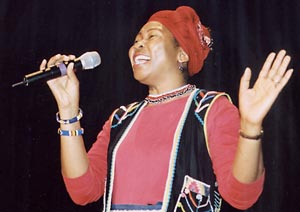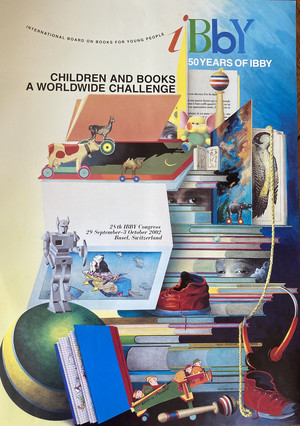Congress 2002
28th IBBY International Congress Basel 2002
IBBY's Jubilee Congress in Basel "Children and Books – a Worldwide Challenge" 50 Years of IBBY
"Wonderful, exciting, rewarding, bravo, congratulations! " "The Congress was one happy dream!" "A unique opportunity to meet people you know and admire as well as to make new acquaintances!" "We have discovered IBBY and a lot of interested and passionate people!" "I enjoyed every moment!" "The best IBBY Congress ever!"
The Organizing Committee of the 50th anniversary Jubilee Congress of IBBY in Basel (29 September to 3 October 2002) is gratified about the overwhelmingly positive feedback of the participants. The friendly atmosphere, the high level of the programme with illustrious speakers and the festive social events were praised as well as the exhibitions and publications depicting IBBY's activities.
While the lectures, seminar contributions, exhibitions and publications and hundreds of details relating to the registration and accommodation of the 450 participants from 50 countries were planned and prepared well in advance, the attendance of the patrons with nearly one hundred accompanying persons, media people and security officers additionally challenged the organizational capacities of the two-person Congress Secretariat. Even with careful planning, however, there was no way of influencing the weather. It just happened that a period of "imperial weather" — Kaiserwetter — gilded the Congress days in Basel, including the concluding excursion to Lucerne and Mount Pilatus.
The fact that the distinguished patrons, Her Majesty Empress Michiko of Japan and H.E. Ms. Suzanne Mubarak of Egypt, attended the whole Congress was a great honour for IBBY. They were joined for the Opening Ceremony and for a special viewing of the IBBY exhibitions by the third patron, Ms. Ruth Dreifuss, Minister of Home Affairs and Past President of the Swiss Confederation.
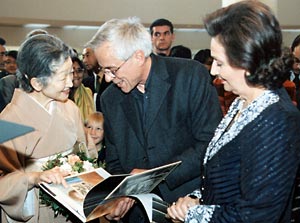
The Opening Ceremony started with a welcome address by Leena Maissen, IBBY's Executive Director and Congress Chairperson. She greeted the honoured patrons and government officials, participants, speakers and sponsors, media people, volunteers and guests who had come from near and far to celebrate the 50th anniversary of IBBY in Basel. She sketched the birth and growth of IBBY, with Jella Lepman as its founder-mother, and emphasized that with this Jubilee IBBY was celebrating all the tens of thousands of individuals who have contributed to IBBY's aims during the past fifty years. They have done so because they believe that literature and reading are important means for preserving and sharing cultural heritage, and because they are convinced that books for children are indeed an effective tool for promoting international understanding.
Subsequent speeches also paid tribute to IBBY's founder Jella Lepman. One of the highlights of the ceremony was the re-launch of the English edition of her memoir "A Bridge of Children's Books", published by The O'Brien Press of Dublin in cooperation with the IBBY sections in Ireland and USA.
In her address, IBBY's President Tayo Shima quoted the Finnish writer Tove Jansson. According to her, the world of children is one where everything is possible, where safety and catastrophe run on parallel courses and where even catastrophe carries its own magic. Children's books, said Tayo Shima, are our magic link between the worlds of adults and children. The task of putting good books in the hands of children — the work of IBBY — parallels the task of passing the wisdom of humankind from one generation to the next.
Dr. Carlo Conti, President of the Government of Canton Basel-Stadt, welcomed the guests to Basel, a city with a remarkable humanist tradition and a lively and continuing appreciation of the arts. Basel is proud to be the seat of the IBBY Secretariat, he said.
Ms. Ruth Dreifuss brought the greetings of the Swiss government. An avid reader herself, she quoted Astrid Lindgren by saying that reading is a "boundless childhood adventure".
When I discovered, nearly sixty years ago, that letters were sounds, that letters became words, words became sentences and sentences stories, the world really opened up for me. I was continually setting off on journeys of discovery, on journeys through time to other epochs, meeting people who lived at the other end of our world. I also went on journeys inward to the self, which took me to new perceptions, new emotions and new feelings. But all that was not served up to me on a plate. The authors invited me to take an active role. It was up to me to create the pictures in my head. And I'm glad to say, the "boundless childhood adventure" did not stop with childhood. Every time I open a book today, I still get that feeling of omnipotence. Those little black symbols have a meaning, and I can decipher them and discover their secret.
Ms. Suzanne Mubarak, First Lady of Egypt, has been the President of the Egyptian Section of IBBY since its foundation in 1985. She expressed her great pleasure in being able to celebrate the Jubilee of IBBY whose work she has found to be one of the most fulfilling tasks she has been involved in.
Our joint mission continues to inspire and motivate all those who believe in the great value of children's books, the act of reading and learning, in shaping a better future. It is now a fact that our efforts have resulted in bringing the world closer to the ideal of universal reading. In all corners of the world, human societies are benefiting from books, and children are learning the joy of reading and the values of tolerance, mutual understanding, sharing and cultural diversity. We are gathered here from all over the world, to work together, to bring as many books to as many children as we can — books which are suitable for all times, bringing joy and learning to our younger generations. That has been the essence of the wonderful story of IBBY. One day lovers of books will share the wonderful story of IBBY by saying: Once upon a time — or in Arabic "Kan Ya Makan" — a group of people who had a common goal and a strong belief in the value of books managed to change the future of humanity. Indeed, we must never underestimate the power of the word. It is through words and images that people have shared their thoughts and feelings, their fears and aspirations and their dreams to create a better future — this is what IBBY is all about — shaping a better tomorrow.
In her equally personal and moving speech, Empress Michiko first outlined the beginning of her involvement with IBBY as a translator of Michio Mado's poems more than ten years ago and then referred to the importance of reading as a child during wartime in Japan and later, reading to her own children as a young mother.
When I was invited to attend this Congress, I hesitated at first thinking that I lacked professional qualifications. I asked myself what I could do for the Congress, and one answer I could come up with was based on the fact that I am one of the many who were greatly benefited by the books read as a child. I thought that I could at least share with you my deep gratitude for books, and I also could convey my appreciation to you for what all of you are doing to bring books and children together. And that set me on the journey to Basel. Perhaps it was the little girl who still lives in me who urged me to come here to attend the Congress.
I trust that IBBY will continue to perform its activities for many years to come, as there will always be people who believe both in the values of books and the potentialities of children. The theme of the Congress — "Children and Books — a Worldwide Challenge" seems to me to be an expression of the strong sense of mission by the people who support IBBY.
All of us are aware of the fact that there are children in the world today who are not only deprived of books, but even opportunities to learn how to read and write due to economic or social reasons. There are also children who are forced to spend their days in fear and dread in the areas of strife. My heart grieves to think that there are too many such children. I find it encouraging though that many of the IBBY members have already given thought to the fact and have been putting their thoughts into action. It will not do for us only to shed tears over the plight of these children, and just pity them as poor unfortunates. Rather, I would place my hope in such children, for they might lead our world of tomorrow with the new wisdom that only those who have experienced utmost sorrow and pain and yet survived them could possess. Please trust the great potentialities of those children who are struggling with adversity, and please never lose them out of your sight.
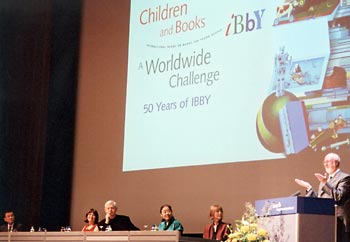
After a musical interlude giving a taste of the Basel Carnival, the Hans Christian Andersen Awards were presented. Following the laudatio by Jury President Jay Heale, the author winner Aidan Chambers emphasized how deeply Anne Frank and her diary had impressed and influenced him. He concluded his speech by saying that for him writing and reading literature is a moral and a religious matter.
In conferring the Hans Christian Andersen Award on me today, this is what I feel you are honouring. You are not honouring me for myself. I do not in myself deserve such an honour. You are, I think — I hope — honouring that strange, that mysterious, that inexplicable process, that art we call literature, by which we may be brought to the highest possible degree of unselfish self-consciousness and a fearless, clear-minded and — this above all — an imaginative understanding of life.
The illustrator winner Quentin Blake could not attend the ceremony but presented his thank-you speech via video, describing — through quick sketches on a flipchart — his ideas and concepts of combining words and pictures. The honoured patrons were delighted to receive artwork specially made for them by Quentin Blake to commemorate their presence at the Jubilee Congress.
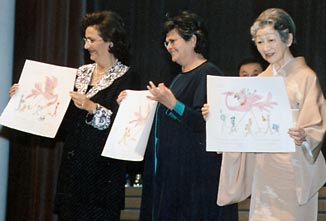
The first day concluded with a gala reception sponsored by Nissan Motor Co. Its Vice Chairman, Mr. Takeshi Isayama, confirmed Nissan's intention to continue supporting the Hans Christian Andersen Awards.
The following three days offered a rich choice of programme. The first speaker, Peter von Matt, Professor of German Literature at the University of Zurich, dealt with the difference between the adult and the child and the idea of human perfection. "What Came First, the Chicken or the Egg? On the Creation of the World through the Imagination of the Young" was the title of his lecture in which he quoted Meister Eckhart and analysed E.T.A. Hoffmann's "The Nutcracker".
The idea of human perfection is as familiar to us as the idea of a just and peaceful world. We keep hoping, against all indications, for the stepwise rapprochement of the world of man towards everlasting peace with justice and well-being. We not only hope; we also work towards it. We work towards it in politics and in world-wide organizations and aid agencies. It must be possible, we think, for this tormented planet to work properly some day: for everyone to have enough to eat and for no one to be persecuted and for men who are convinced they are right no longer to kill other men who are also convinced they are right. We are working towards this, even though we know better. And this is how we work on the individual human being, on the child. The child that is so much the beginning — the most flesh-and-blood manifestation of beginning and origin — embodies man's highest possibilities. In the child, the idea of human perfection appears to us and forces us to think of it and to strive towards its realisation. Our work on the child and with the child is always work on the future: work in the hope of a better world.
The title of Lilia Ratcheva-Stratieva's (Bulgaria) presentation was "Children's Books for a Better World. Can Children Save the World? Can Children's Books Change the World?" Her talk brought up the idea of childhood in society and the dream of another world order, the creation of parallel worlds. She illustrated her points by analysing works by four European children's writers who were active during the first half of the 20th century: King Matt the First by the Polish educator Janusz Korczak; Three Fat Men by the Russian author Juri Olesha; The Animals' Conference by the German Andersen Award winner Erich Kästner and The Adventures of Cipollino by the Italian journalist Gianni Rodari, also an Andersen Award winner. In all these books, with the help of children, utopian societies are established as counter worlds, as alternatives to the corrupt and unjust adult world. Lilia Ratcheva-Stratieva also spoke about the impact these books had on children at the time when the books were written and today. Where was the meeting point between the intention of the author and the reaction of the reader?
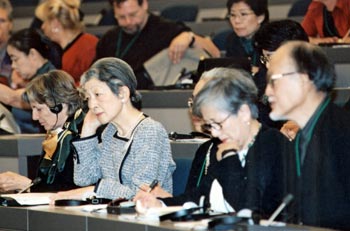
Andersen Award winning author Ana Maria Machado (Brazil) entitled her speech "Words to Bridge Gaps. Children's Books as a Bridge between Adults and Children". She compared the process of translating and writing for children:
The best children's authors should be bilingual, and master very well both the language of adulthood from which they are translating and the language of childhood into which they are making their version.
Children's books may be a bridge between generations. But there is no sense in building bridges that allow only one-way crossing. And if we want books to be bridges, not toboggans, if we are to have reciprocity and accept that children's reading may also interfere creatively in books written by adults, we must insist that those texts be part of the whole literature. They must, then, belong to a world where the art of words is not ruled by psychological, pedagogical or market concerns, but are subject to the same demands and strict criteria of judgement and critical analysis as any great creation of human mind that chooses words as its means of expression.
Jeffrey Garrett (USA), former editor of Bookbird and now elected President of the Hans Christian Andersen Jury, spoke about "IBBY's Awards and Selections: Can There Be International Standards of Excellence?" His powerpoint presentation showed examples of artwork by illustrators from Ireland, Belgium, Slovak Republic, Italy and Japan. He concluded by saying that an understanding of what is quality (beauty, truth) today requires an anticipatory appreciation that the world might be differently perceived through the eyes of artists from other cultures without being somehow "wrong" or "bizarre".
But it also requires that we trust our instincts, taking the time to inform these instincts by learning something about the culture of the artist at hand — without surrendering ourselves to the exoticist's view that the fruits of foreign cultural production must remain inscrutable without years of training. What we are seeing more and more today in the world of children's book illustration is the total permeability of borders when it comes to artistic forms, artistic motifs... Children's book art today is increasingly international, eclectic, cross-pollinating.

Noushine Ansari, Secretary General of the Children's Book Council of Iran (CBCI), spoke about "The Right to Books as a Global Commitment" with particular reference to Iran. She described the cultural heritage of her country and the search for identity through national literature and the need to strike a balance between original and translated literature. CBCI's insistence on authentic expression has attracted both creators of indigenous works and students of children's literature. Furthermore, participation of the young is one of the first priorities on the CBCI agenda. Young people between 10 and 16 have acted as consultants on the Encyclopedia for Young People and participated in groups dealing with creative writing, literary criticism as well as projects for children with special needs.
In his lively lecture, entitled "Books for a World without Readers?" Norwegian author Jostein Gaarder talked about the story providing the whole of humanity with a common "mother tongue" — across all political, cultural and historical divides. He emphasized the responsibility of parents in today's society since growing children still want and feel the need for books.
The story is a form of comprehension peculiar to human beings — and as such above all cultural differences. There has hardly been a culture in the history of the world that hasn't fostered a set of myths, fairytales and legends. And in the same way, each individual has their own life story because we don't live digitally or cyclically, we live linearly and sensually.
He also spoke about why he began to write: I realised that I was only on earth for a short visit. I'm here only once, and I won't be coming back. This was the reason I began to write, first for adults and then for children as well. I wanted to take revenge. Now that I was more able to express myself than I had been as a child, I wanted to try to make people stop and take note of this extraordinary adventure we pass through all too fleetingly — the great mystery of life. To experience this, perhaps we need to be like children once again.
One of the main plenary sessions at the Congress was devoted to the audiovisual presentation of projects which have won the IBBY-Asahi Reading Promotion Award. All of them were moving and impressive testimonies of creativity and perseverance in unusual or difficult circumstances: The French initiative Lis avec moi! serves disadvantaged communities and stresses the importance of encouraging parents to read with their children from the earliest age. The Japanese Fureai Bunko Braille Library Collection came into being because a blind mother wanted to share picture books with her seeing children. The Opération Lecture Publique takes books to the remotest corners of the Saharan state of Mali. The Portable Libraries project of Lebanon started as a service to refugee camps and bomb shelters during the war. The 2002 winner, Por el Derecho a Leer/For the Right to Read, an activity of CEDILIJ (Centro de Difusión e Investigación de Literatura Infantil y Juvenil), reaches thousands of children in rural areas, schools and hospitals in Argentina.
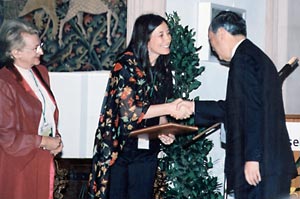
The Historical Museum of Basel, located in the medieval Barfüsserkirche, provided the festive surroundings for the presentation of the IBBY-Asahi Reading Promotion Award 2002 during a reception hosted by the Government of Canton Basel-Stadt. Jury President Loty Petrovits gave the laudatio and together with the President of the Asahi Shimbun, Mr. Shin-ichi Hakoshima, presented the check of US$10'000 and the diploma to Cecilia Bettolli who represented the winning Argentinian project. In her acceptance speech she said:
We know that if we do not eat, we cannot think. But we also know that if we do not think, we have no future. Sometimes temptation is hard, but there is no option between bread and books, we need both. Culture, as a social asset, doesn't have to exclude anybody. That is why we work "For the Right to Read". To avoid that the urgent displaces the important. And because reading is not only reading, and "a book is not only a book as some fools believe: a book is always people". Reading, as a social practice of knowledge and communication, has no real value if it doesn't involve emotionally those who practice it; if we don't make it meaningful according to our individuality contributing to the common cultural asset with our interpretation, our knowledge, our emotion.
A whole day was devoted to children's book creators. A panel chaired by Renate Raecke joined the Andersen Award winners Christine Nöstlinger, Jörg Müller, Kveta Pacovska, Katherine Paterson and Aidan Chambers who discussed their recent work and topics that they considered especially relevant and important today.
Thirty-four nominees on the IBBY Honour List 2002 had come from twenty-four countries to the Jubilee Congress in Basel to receive their diplomas for excellence in writing, illustrating and translating. Leena Maissen gave a visual presentation of all the nominated titles for writing and illustration and Tayo Shima and Liz Page handed out the diplomas and gifts. Malaysian author Khadijah Hashim thanked on behalf of the nominees, emphasizing the importance of the opportunities provided by IBBY to make known children's literature from different regions of the world.
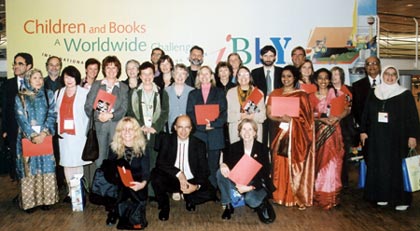
IBBY's aims, current and future tasks were topics of two panel discussions with speakers from five continents. "Jella Lepman and the Founding of IBBY. Are Children's Books Still an International Issue?" was chaired by former Andersen Jury President and translator Patricia Crampton. It brought together former Presidents Dusan Roll and Ronald Jobe, the doyenne of American children's publishing Margaret McElderry and the pioneer of German children's literature research Klaus Doderer. While the panelists clearly agreed about the relevance of children's books internationally, there were sceptical voices concerning the real possibilities to promote translations and books in original languages, especially within the domineering Anglo-Saxon market.
Incoming IBBY President Peter Schneck chaired a panel session dealing with ideas and proposals concerning the aims and activities of IBBY, entitled "Utopia or Reality? IBBY's Role Today and Future Tasks". The participants included individuals who are active in IBBY: Patsy Aldana, publisher from Canada and former Vice President; Evangeline Ledi Barongo, children's librarian from Uganda; Carmen Diana Dearden, Past President of IBBY and President of Banco del Libro in Venezuela; Michael O'Brien, publisher and President of IBBY Ireland; Nilima Sinha, author, current IBBY EC member and President of IBBY India as well as Kestutis Urba, university professor and President of IBBY Lithuania. All of them emphasized the importance of IBBY as a worldwide network: if it did not exist it would have to be invented. All agreed that IBBY could be strengthened by stronger regional cooperation.
Michael O'Brien brought IBBY's political role into discussion which was continued at the General Assembly. To what extent is IBBY's mission of providing books to all children everywhere compatible with its policy of only accepting organizations from sovereign states as National Sections? Should IBBY not make an exception to the adopted UN policy and accept Palestine as a full member? And what about other territories and non-sovereign countries who would like to join IBBY? After an emotional discussion and a vote of recommendation at the General Assembly, this issue was submitted to the new Executive Committee to study and solve.
Many other presentations and events filled the days of the Congress. Twelve seminar sessions dealt with the main topics of the Congress. Authors, illustrators and translators had been invited to make presentations of their work. Three professional groups provided opportunities for authors, translators, illustrators as well as librarians and educators to meet. The newly constituted Swiss Section of IBBY, i.e. the Swiss Institute for Child and Youth Media, invited the participants to its exhibition "Schau genau! Regarde bien! Look twice!" at the University Library. Parallelling the 50 years of IBBY's existence, the exhibition showed picture books from the second half of the 20th century, mainly from the collections of Bettina Hürlimann and Elisabeth Waldmann, who had both been closely involved with IBBY.
The Jubilee Congress concluded with a festive evening at the Stadt-Casino, with a fairy-tale menu combining a banquet with stories, music and dance. Nina Reidarson and Christian Stottele were made Honorary Members and thanked for their extraordinary contribution to IBBY. The Russian author Sergei Mikhalkov spoke as the oldest acting President of an IBBY section.Thanks were expressed to outgoing and incoming Executive Committee members and to the Organizing Committee — in particular to Tayo Shima, Leena Maissen, Liz Page and Urs Breitenstein. Everything culminated with the handing over of the baton to the next Congress organizer Jay Heale, followed by an overwhelmingly vibrant invitation to Cape Town in 2004 by South Africa's famous storyteller Gcina Mhlophe.
